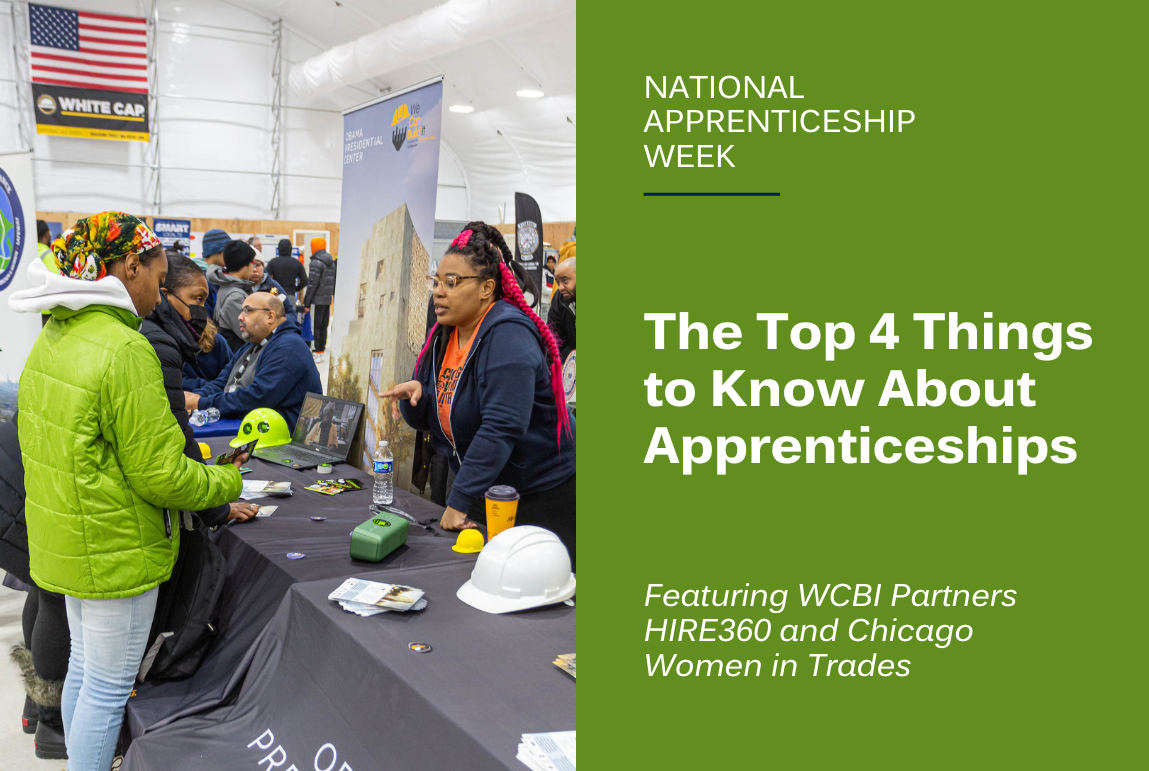The Top 4 Things to Know About Apprenticeships
From November 13-17, employers, industry associations, educators, unions and community-based organizations come together to celebrate National Apprenticeship Week and raise awareness of careers requiring skilled labor. This year’s theme, “Registered Apprenticeship: Superhighway to Good Jobs,” draws on the importance of the word “registered,” which qualifies an apprenticeship as industry-vetted, industry-led and validated by either the U.S. Department of Labor or a state apprenticeship agency.
That legitimacy is crucial when it comes to apprenticeships accomplishing what they were meant to do: create clear pathways to industry certifications and employment; improve job quality; and help industries solve worker shortages by building talent pipelines. Apprenticeships have also been credited with advancing access to well-paying jobs for historically underrepresented groups such as women, people of color, youth and young adults, and people with disabilities.
Advancing diversity, equity and inclusion in construction is a pillar of Lakeside Alliance’s mission. Thanks to the work of the We Can Build It (WCBI) consortium, the official workforce partnership for the Obama Presidential Center project, Lakeside Alliance has welcomed numerous apprentices across a range of skilled, building trades on-site since breaking ground in September 2021.
It’s critical that apprentices know what to expect going in, said Damian Flores, program manager at HIRE360 Chicago, a WCBI partner and community-based organization that expands professional development and employment opportunities in the trades for underrepresented groups.
As we enter National Apprenticeship Week, here are the top four things to know about apprenticeships:
#1 – Apprenticeships last for years and offer wage progression.
Depending on the trade, it can take anywhere from two to five years to complete an apprenticeship and graduate to journeyperson status. Apprentices must complete a certain number of work hours each year to advance their worker status and salary. Once apprentices achieve journeyperson status, their salaries can skyrocket to the top of their trade’s pay scale and they can earn wages that are competitive with a four-year college graduate’s.
#2 – There are apprenticeship opportunities out there, but they aren’t always easy to find.
As important as apprenticeships are to building and sustaining talent pipelines, one of the biggest obstacles to becoming an apprentice is lack of awareness. Whereas internships are often more readily publicized and searchable online, registered apprenticeships tend not to be advertised as broadly, said Lindsey Wright, manager of marketing and communications for Chicago Women in Trades (CWIT). Flores and Wright said WCBI is stepping up engagement with Chicago Public Schools, conducting outreach and going into classrooms with contractors, tradespeople and apprenticeship coordinators to overcome this gap in access and awareness.
“We try to reinforce our message with somebody that’s really in the industry,” Flores said. “It's good to have somebody who can say, ‘Hey, this is how successful you can be in this alternate career route that's not usually pushed in schools.”
WCBI also works with trade unions and workforce and community-based organizations to host information sessions at the Lakeside Alliance Resource Center, which can be found on our event calendar.
#3 – Apprenticeships require planning ahead.
It can take up to six months or longer to get accepted into an apprenticeship program, and some training providers only offer the required testing once a year. While apprenticeships require advance planning, there are unions that accept applications year-round. Lakeside Alliance has information on current opportunities on our website.
#4 – There are resources available to help you secure an apprenticeship.
To get into an apprenticeship program in construction, an individual must be placed. Placement includes testing, primarily in math. “Knowing what you need to do to be able to take the pre-apprenticeship test is within itself a bit of a barrier,” Wright said. However, unions, workforce development programs, community- and faith-based groups offer test preparation so candidates can brush up on math and other necessary skills. All pre-apprenticeship training programs can be a resource for anyone preparing to apply and be accepted into an apprenticeship program.
WCBI partner St. Paul Community Development Ministries offers a 12-week pre-apprenticeship training program to support candidates through this process — and graduates of the program are currently working on-site!
National Apprenticeship Week Calendar
Apprenticeship Illinois has a wealth of information on how to celebrate National Apprenticeship Week. Visit their website to learn more and register for free informational webinars.

